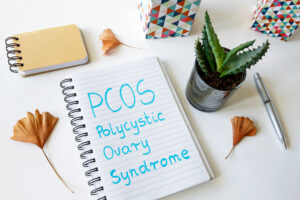
If you’re dealing with PCOS, you may have heard the controversies regarding dairy and it’s potential impact on PCOS symptoms. You may be wondering: Is dairy as scary as everyone says it is? Will cutting out dairy completely from my diet alleviate my symptoms?
This article will unpack the dairy controversy and hopefully answer some of your burning questions. But first …
What Is Dairy?
Dairy products refer to any foods that are made from or contain milk from a mammal (eg. cheese, yogurt, cream).
Benefits of Dairy:
There are so many great reasons to include dairy in your diet! Not only are dairy products complete proteins – containing all 9 essential amino acids – but they also contain a variety of important nutrients and health benefits, such as:
- Calcium, phosphorus, and Vitamin D – important for strengthening and maintaining bone health
- Zinc – supporting a healthy immune system
- Potassium – helpful for lowering blood pressure
- B-vitamins – necessary for maintaining various cell functions
Why Is Dairy So Controversial?
There aren’t many studies specifically looking at PCOS and dairy, but a few concerns have been raised:
- Insulin resistance
One of the possible causes of PCOS is insulin resistance. This condition leads to higher androgen levels, interfering with menstruation cycles, causing acne, and contributing to weight gain and increased risk of other health conditions that worsen PCOS symptoms. While some research has found that dairy products may increase the risk or worsen insulin resistance, other studies have found the opposite. For example:
- A 2015 study with 272 middle-aged, nondiabetic women found that those who consumed more dairy had higher HOMA-IR scores, indicating higher insulin resistance.
- On the other hand, a 2015 systematic review of 10 intervention studies found that in individuals without Type 2 diabetes, higher intake of dairy led to improved insulin sensitivity. (after 12 weeks, but not significant changes in studies lasting less than 8 weeks).
- Another systematic review conducted in 2019 suggested that dairy intake may have positive effects on insulin sensitivity and body weight.
- Some studies, such as this 2015 study, have even found no significant effects of dairy on insulin sensitivity. Therefore, the results are inconclusive when it comes to the effects of dairy on insulin resistance.
2. Acne
Some studies have suggested a connection between dairy consumption and acne breakouts, but more research is needed. For example:
- A 2005 study found that participants who had experienced severe teenage acne in high school also had higher dairy intake. Dairy had the largest impact among the foods thought to cause acne (eg. french fries, chocolate).
- Italian adolescents and young adults in a 2012 study were more likely to develop moderate to severe acne with higher milk consumption. However, other factors like family history of acne and higher Body Mass Index also influenced this risk.
3. Ovulation-related fertility
Like many of the concerns listed above, there are mixed results on the effects of dairy on ovulation-related fertility.
- A 2014 cross-sectional study of 400 Iranian women found that among women with PCOS, there was a higher consumption of low- and free-fat milk. But, this may have more to do with the type of dairy being consumed than the amount.
- Another study did not find a significant association between regular dairy intake and infertility, but found that higher intake of low-fat dairy products increased the risk of ovulation-related infertility. Conversely, higher intake of high-fat dairy products decreased the risk.
Overall, more randomized controlled studies need to be done on the effects of dairy on PCOS symptoms. However, in general, if you have PCOS, you don’t need to completely avoid dairy; moderate amounts of dairy can be included in your diet.
So, What Type and How Much Dairy Is Safe to Eat?
There isn’t a specific dairy requirement, but the general recommendation for women with PCOS is 2 or fewer servings of dairy each day.
Additionally, try to focus on the full-fat versions of dairy products for these servings, as they have higher levels of estrogen and have less of an effect on insulin levels, which may improve PCOS symptoms (eg. acne, ovulation and fertility)
Tips on Incorporating Dairy into Your Diet:
- Add yogurt or kefir into your smoothies – creamy, delicious, and full of calcium for maintaining bone health and probiotics for regulating insulin levels.
- Pair your favorite fruits, vegetables, and/or nuts and seeds with some cheese for the perfect afternoon snack.
- Substitute water in your oatmeal with milk for a richer, creamier flavor.
What If I Have Lactose Intolerance?
The average adult needs 1,000 mg of calcium/day, which can easily be achieved through consuming a variety of dairy products. If you’re lactose intolerant, don’t worry! There are plenty of non-dairy sources you can add to your diet to meet your calcium needs, such as:
- Milk alternatives (almond, hemp, rice, coconut)
- Dark leafy greens (kale, broccoli, bok choy)
- Canned fish (sardines, salmon)
- Seeds (chia, sesame, flax)
- Soy foods (tofu, edamame)
The Bottom Line About Dairy and PCOS
If you’re currently dealing with PCOS, you may not have to completely stop eating your favorite dairy foods. It ultimately depends on your specific symptoms and tolerance levels. If you find that you can’t tolerate dairy, don’t worry! Just make sure you replace your dairy products with non-dairy sources for adequate calcium and vitamin D intake!
Ready to take charge of your PCOS symptoms? Schedule a consultation with our dedicated dietitian today! Our specialized dietitian will tailor nutrition recommendations specifically to your unique needs and situation. Don’t let PCOS hold you back-empower yourself with expert help and personalized nutrition.